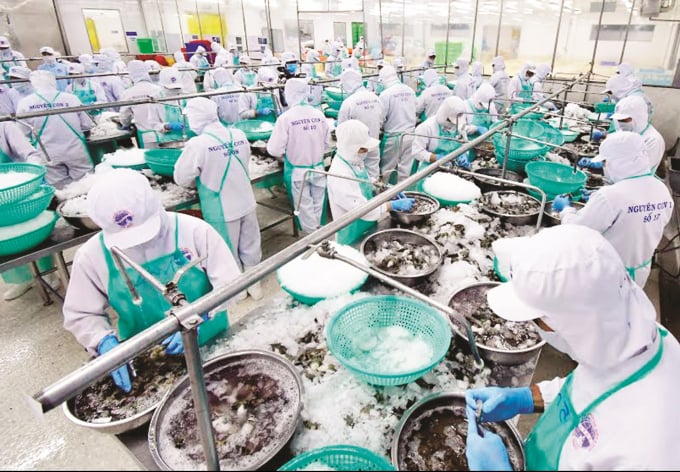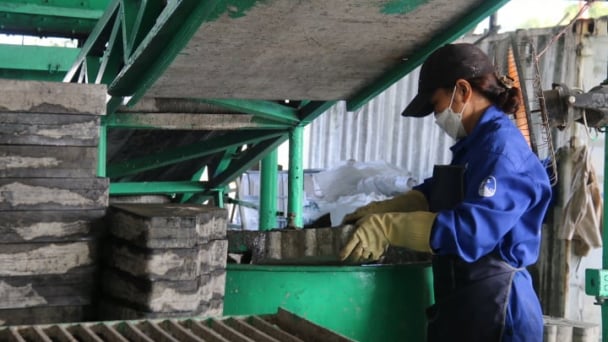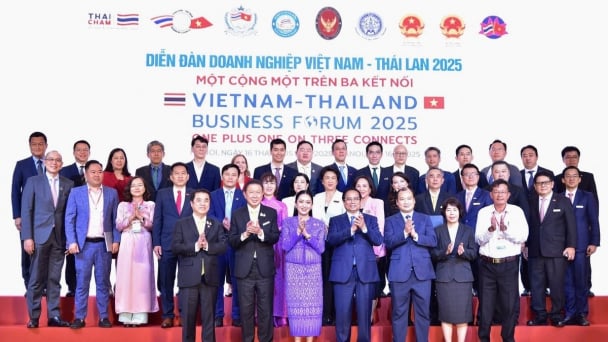May 19, 2025 | 15:04 GMT +7
May 19, 2025 | 15:04 GMT +7
Hotline: 0913.378.918
May 19, 2025 | 15:04 GMT +7
Hotline: 0913.378.918

Vietnam's shrimp industry, besides preliminarily processed products, also has value-added products that acquire a firm position in the market. Photo: TL.
The Covid-19 epidemic wreaked havoc on agricultural productivity in general, and fisheries in particular, throughout the nation. Farmers' and enterprises' input material supply networks, as well as their culture, purchasing, and processing operations, are sluggish and disrupted.
Without severe actions to address present bottlenecks, the fisheries industry may struggle to meet this year's objective of USD 8.8 billion in export turnover.
Additionally, it increases the possibility of raw material shortages in the last months of the year, hampering processing and exporting activities when firms resume regular operations after the Covid-19 pandemic.
According to Tran Dinh Luan, Director of the General Department of Fisheries (Ministry of Agriculture and Rural Development), it is critical to provide solutions for processing facilities, but the most critical aspect is to create favorable conditions for farmers to maintain production and earn income.
Mr. Luan said that beginning in July and August, the breed production system decreased capacity by 30% to 40%. Additionally, the volume of breeding in certain areas was reduced by 40%.
Due to a decline in breed sowing, the number of breeds has increased. The Directorate of Fisheries has recommended that corporations assist farmers' breeds to reintroduce output.
"As a result, the agricultural business has compiled data and re-evaluated the amount of broodstock remaining, determining if it is sufficient to assure output or not... At the moment, hatcheries maintain over 55,000 broodstock, which is sufficient to provide seed for the next six months of farming ", Mr. Tran Dinh Luan stated.
Additionally, according to the fisheries sector's chief, up to 15 aminal feed manufacturing factories are ceasing operations owing to the finding of Covid-19-positive cases. However, with present capacity, companies can produce over 2 million tons of feed in the last months of the year, so this is not an issue.
"The issue that requires our attention is harvesting, transportation, and circulation. Currently, circulation between villages, inter-provinces, etc., faces several challenges that must be addressed. In August, we recommended individuals to plant seeds sparingly, so lengthening the culture time. These innovative solutions enable individuals to continue stocking and maintaining a constant supply of raw materials for companies ", the General Department of Fisheries' chief stated.
Apart from pre-processed items, Vietnam's shrimp business also produces value-added products with a strong market position. As a result, the supply of raw materials for value-added goods must be quickly restored and maintained.
Mr. Tran Dinh Luan, who spoke about illness prevention and seafood quality control, said that in 2021, production direction would encounter several obstacles owing to its inability to proceed smoothly.
As a result, the Directorate of Fisheries has strengthened remote directing efforts via meetings and online instructions to ensure that communities understand the same goal, respond quickly to unforeseen events, and avoid interrupting supply and output.
Additionally, the directorate maintains contact with the commune and local farmers to ascertain current conditions and give technical guidance. Particular emphasis is placed on predicting and advising on the climate and weather to mitigate production risks and optimize costs.
"The leading and directing task is always maintained consistently. Each area has a unique set of circumstances. In light of the present outbreak, the General Department provides daily advice to local authorities and enterprises on how to effectively manage the situation to maintain normal operations "Mr. Tran Dinh Luan said.
Translated by Linh Linh

(VAN) The German Agricultural Society (DLG) explores the possibility of establishing a mechanization service center in Vietnam’s Mekong Delta to support farmers in accessing and utilizing advanced machinery.

(VAN) On May 16, the Department of Water Resources Management, in collaboration with the Food and Agriculture Organization of the United Nations (FAO), held a signing ceremony for the GEF-8 project document.

(VAN) Food safety, mechanization, vocational training, and market opening are key areas of cooperation expected between the Vietnamese Government and the Federal Republic of Germany.

(VAN) Deputy Minister Nguyen Quoc Tri also expressed his hope that Cuba will soon overcome its current challenges, attain food security, and further expand cooperation with Vietnam.

(VAN) The project contributes to enhancing the resilience of communities vulnerable to the impacts of climate change, with a primary focus on local women.

(VAN) Green materials help save energy and resources. However, after more than 10 years, Vietnam has only developed over 200 green buildings with more than 6 million square meters of floor space.

(VAN) Vietnam - Thailand Business Forum 2025: One plus one on three connects, marking a milestone in the comprehensive strategic partnership between the two nations.